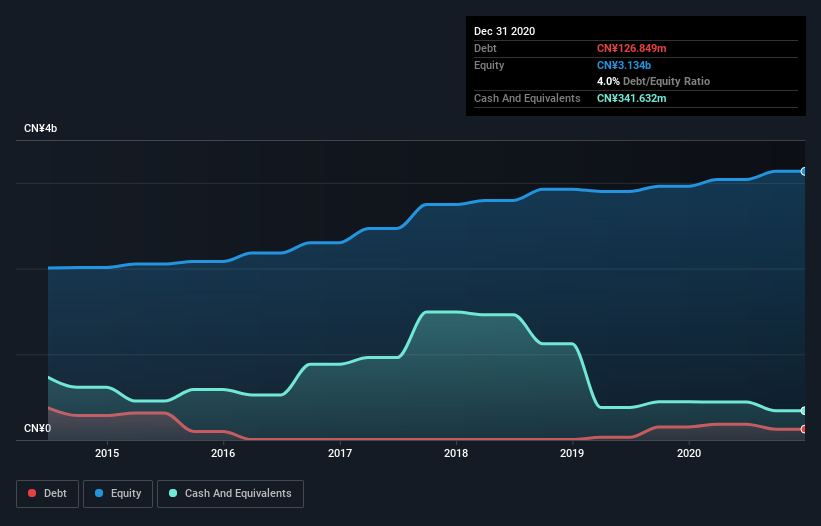
The external fund manager backed by Berkshire Hathaway's Charlie Munger, Li Lu, makes no bones about it when he says 'The biggest investment risk is not the volatility of prices, but whether you will suffer a permanent loss of capital.' So it seems the smart money knows that debt - which is usually involved in bankruptcies - is a very important factor, when you assess how risky a company is. We note that China Starch Holdings Limited (HKG:3838) does have debt on its balance sheet. But the more important question is: how much risk is that debt creating?
What Risk Does Debt Bring?
Debt is a tool to help businesses grow, but if a business is incapable of paying off its lenders, then it exists at their mercy. In the worst case scenario, a company can go bankrupt if it cannot pay its creditors. However, a more frequent (but still costly) occurrence is where a company must issue shares at bargain-basement prices, permanently diluting shareholders, just to shore up its balance sheet. Of course, the upside of debt is that it often represents cheap capital, especially when it replaces dilution in a company with the ability to reinvest at high rates of return. When we think about a company's use of debt, we first look at cash and debt together.
View our latest analysis for China Starch Holdings
How Much Debt Does China Starch Holdings Carry?
The image below, which you can click on for greater detail, shows that China Starch Holdings had debt of CN¥126.8m at the end of December 2020, a reduction from CN¥151.4m over a year. But on the other hand it also has CN¥341.6m in cash, leading to a CN¥214.8m net cash position.

A Look At China Starch Holdings' Liabilities
The latest balance sheet data shows that China Starch Holdings had liabilities of CN¥1.07b due within a year, and liabilities of CN¥361.9m falling due after that. Offsetting these obligations, it had cash of CN¥341.6m as well as receivables valued at CN¥582.8m due within 12 months. So it has liabilities totalling CN¥508.9m more than its cash and near-term receivables, combined.
While this might seem like a lot, it is not so bad since China Starch Holdings has a market capitalization of CN¥888.2m, and so it could probably strengthen its balance sheet by raising capital if it needed to. However, it is still worthwhile taking a close look at its ability to pay off debt. While it does have liabilities worth noting, China Starch Holdings also has more cash than debt, so we're pretty confident it can manage its debt safely.
Better yet, China Starch Holdings grew its EBIT by 151% last year, which is an impressive improvement. If maintained that growth will make the debt even more manageable in the years ahead. The balance sheet is clearly the area to focus on when you are analysing debt. But it is China Starch Holdings's earnings that will influence how the balance sheet holds up in the future. So when considering debt, it's definitely worth looking at the earnings trend. Click here for an interactive snapshot.
But our final consideration is also important, because a company cannot pay debt with paper profits; it needs cold hard cash. China Starch Holdings may have net cash on the balance sheet, but it is still interesting to look at how well the business converts its earnings before interest and tax (EBIT) to free cash flow, because that will influence both its need for, and its capacity to manage debt. Over the last three years, China Starch Holdings saw substantial negative free cash flow, in total. While that may be a result of expenditure for growth, it does make the debt far more risky.
Summing up
While China Starch Holdings does have more liabilities than liquid assets, it also has net cash of CN¥214.8m. And we liked the look of last year's 151% year-on-year EBIT growth. So we don't have any problem with China Starch Holdings's use of debt. When analysing debt levels, the balance sheet is the obvious place to start. However, not all investment risk resides within the balance sheet - far from it. For example, we've discovered 3 warning signs for China Starch Holdings (1 is significant!) that you should be aware of before investing here.
When all is said and done, sometimes its easier to focus on companies that don't even need debt. Readers can access a list of growth stocks with zero net debt 100% free, right now.
If you decide to trade China Starch Holdings, use the lowest-cost* platform that is rated #1 Overall by Barron’s, Interactive Brokers. Trade stocks, options, futures, forex, bonds and funds on 135 markets, all from a single integrated account. Promoted
New: AI Stock Screener & Alerts
Our new AI Stock Screener scans the market every day to uncover opportunities.
• Dividend Powerhouses (3%+ Yield)
• Undervalued Small Caps with Insider Buying
• High growth Tech and AI Companies
Or build your own from over 50 metrics.
This article by Simply Wall St is general in nature. It does not constitute a recommendation to buy or sell any stock, and does not take account of your objectives, or your financial situation. We aim to bring you long-term focused analysis driven by fundamental data. Note that our analysis may not factor in the latest price-sensitive company announcements or qualitative material. Simply Wall St has no position in any stocks mentioned.
*Interactive Brokers Rated Lowest Cost Broker by StockBrokers.com Annual Online Review 2020
Have feedback on this article? Concerned about the content? Get in touch with us directly. Alternatively, email editorial-team (at) simplywallst.com.
About SEHK:3838
China Starch Holdings
An investment holding company, manufactures and sells cornstarch, lysine, starch-based sweeteners, modified starch, and ancillary corn-based and corn-refined products in the People’s Republic of China.
Solid track record with excellent balance sheet and pays a dividend.
Market Insights
Community Narratives




